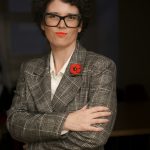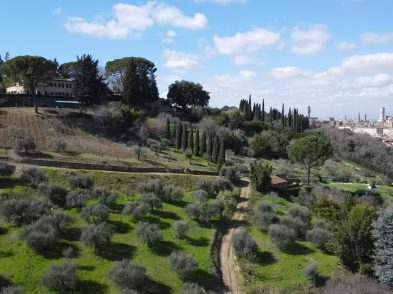Photos by Marco Badiani
After the Tuscan-American Association’s recent Welcome Day, held annually to introduce American study-abroad students to Florence, The Florentine had the opportunity to interview the U.S. Ambassador to Italy, John Phillips. A former attorney with a background in public interest and anti-corruption measures, the ambassador spoke about his love of Tuscany, his involvement in the ‘Lost Leonardo’ campaign and the importance of Milan Expo 2015.
Helen Farrell: In your speech, you mentioned to the American students gathered here today about your Italian ancestry. Can you tell me more these familial roots?
John Phillips: When I first came to Italy right after law school in 1969, I had travelled around many of the countries in Eastern Europe, and when I got to Italy— I took the ferry from Dubrovnik to Bari—it was like coming home, in a sense. It was so much more welcoming than any of the other countries and I had grown up with Italian culture pretty much, with my Italian grandparents and great-grandparents. My wife and I have come to Europe many times. We used to try different countries here and there, but we always ended up coming back to Italy.
HF: It was a homecoming for you?
JP: Yes, pretty much. I think I had been to Italy 70 times before coming here as ambassador. It’s a long connection.
HF: I believe you have a home here in Tuscany. What insight does that give you into the Tuscan culture and lifestyle?
JP: I have a lot of Italian friends. I’ve had that place 14 years now. But eight years was spent restoring it—it was a ruin, a total ruin. It’s in a wonderful spot in a beautiful area, south of Siena near Montalcino.
HF: Great for wine and food then. Do you have a favourite local speciality that you like to indulge in when you’re in Tuscany?
JP: Well, I shouldn’t eat so much pasta, but I do. [Laughs.] My grandmother, who spent most of her life in the garden or in the kitchen, made gnocchi. That was her speciality. My wife and my two sisters-in-law always wanted to know how to make it, but she always kept something out of the recipe, purposely.

HF: Let’s talk trade. With Milan Expo 2015 coming up, in what ways does the international fair and its focus on food fit into the Embassy’s hopes to increase imports and exports for both Italy and the United States?
JP: It works together with our attempts, all of us, to get this Transatlantic Trade Investment Partnership treaty negotiated because it involves certain reducing barriers, not just tariffs. I think that Italy, by all analysis, stands to benefit the most of almost any EU country. But it’s a long slog. We’re hopeful of getting through by the end of this year, beginning of next year. It’s a complicated undertaking of many different parts, but it makes so much sense for everybody to foster and encourage trade. As far as Expo is concerned, food and food security is a big issue. It’s going to become a bigger issue as we go from six to nine billion people on the planet in 35 years. We need all the technology, all the innovation that we can develop to be able to provide for that. You know, America’s really good at innovation and technology, but Expo will be the largest gathering in the world of food-related ministers talking about planning for the next 10, 20, 35 years, about how to work together. So I think it’s a very positive development and we’ve got a way to go to get all the pavilions built. I’ve been up there a couple of times, poured the cement on the floor, etc. [Laughs.]
HF: This evening, we are here in the Palazzo Vecchio for the annual Welcome Day. How do you think the abundance of American university programs in Florence enriches the lives and economies of both Italy and the United States?
JP: Just think of the sheer number of 30,000 students that we have in Italy, which is, I believe, the highest in a non-English-speaking country. Italy is very appealing to American students and universities to locate in Italy and particularly in Florence. Florence is a very desirable place. I think that we estimate that some half a billion euro is spent annually by the students that we have here. Then there’s employment, which is somewhere between 10,000 and 15,000 people directly as a result of the American programs here in Italy. Beyond that, just the rich cultural exchange. Many colleges want the majority of their students at some point during their four years to study abroad, be it in China, South America or Italy. Then you bring that experience back to your college and you share it. It’s an enriching experience for everybody.

HF: Recently, The Florentine has received countless queries about the Foreign Account Tax Compliance Act (FATCA) and its potentially negative effects on U.S. expats. Could you elaborate on this?
JP: I’m aware there may be some confusion as it’s a new agreement that we’ve reached with all countries. But there’s nothing to worry about: there are no new burdens really imposed that you don’t already have. It’s just a way for both countries to make sure we don’t have tax evaders who hide money. I think that Italy could benefit a lot from this as well … FATCA is just designed to regularize the process so that people can understand what the rules are. If you already comply with the rules, it’s not an added burden.
HF: One last question. I hear that you’re involved in the ‘Lost Leonardo’ campaign.
JP: Through National Geographic and Matteo Renzi, I’ve hosted a number of lectures at my place in Tuscany to explain to people the whole background of it and why through all this detective work there’s a very strong probability that the Leonardo is there [ed. in the Salone dei Cinquecento]. Given that Florence is a nuclear-free zone, the problem is being able to use a gamma camera. I’ve talked to Dario Nardella and to Matteo Renzi about getting to the bottom of this—it would be a huge thing for Florence. It would be the biggest art discovery of all time.








